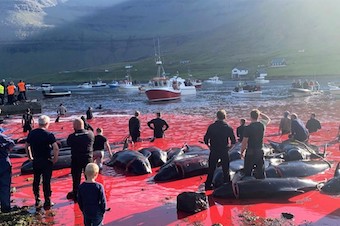We can debate the injustices of factory farming all we like (and we should), but it doesn’t rise to the level of horror of this.
Photo Credit: Sea Shepherd Conservation Society
Whaling’s supporters believe they’ve got an argument that’s a sure winner, with simple math making their case irrefutable. It invariably goes something like this. How can killing a few hundred whales and dolphins compare with the fact that we kill literally billions of animals every year to feed ourselves. The implication is that anyone who continues to eat meat is an obvious hypocrite.
We can raise the obvious objections. The process of killing a whale or dolphin is inherently cruel, at a level that most nations won’t allow in their slaughterhouse if practiced on pigs and cattle. Despite the protestations of whaling’s advocates, no methods have yet been developed to avoid the infliction of enormous suffering on a sentient being. Or the fact that whereas billions of farmed animals pose a significant threat to the environment, cetaceans are a key component of healthy, sustainable marine ecosystems. Killing them is the exact opposite of what we need to do in our fight against climate change. And so on.
But these pale in significance relative to the argument that really matters. Perhaps not from a practical standpoint, but certainly from a moral one. Whaling constitutes a strand of speciesism that is morally indefensible. Yes, I’ve chosen to frame the argument using that term. Here’s why.
We’ve learned a great deal about the nature of many species of cetaceans, and the evidence is compelling that they experience the world in complex, sophisticated terms that are every bit a match for our own. They love, and they grieve the loss of loved ones with an intensity we can easily understand. Who can forget J35 (Tahlequah) a Southern Resident orca mother who pushed her dead calf for 17 days and over 1,000 miles as she mourned. All while the other members of her pod patiently stuck with her as she worked through this painful process and finally was able to let go and move on.
Cetaceans are highly intelligent and obviously self-aware. Captive dolphins presented with a mirror immediately recognize that the individual staring back is themselves. Their brain physiology shows that they possess extraordinary cognitive capacity. In fact, it suggest a social intelligence, the ability to form complex and deep bonds with others, which likely exceeds ours. Like bonobos and humans (indeed a very short list), they have sex anytime and just for fun. They may not look like us, but in a number of ways that speak to their essence, they are really not so different from us. Not inferior to us, and certainly not commodities that we can use as a means to our ends.
There are important animal welfare issues around the topic of factory farming, and we should continue to have those discussions. But at the end of the day, no one is suggesting a moral equivalence between killing a cow and killing a man. We don’t need to be reminded that there is a fundamental difference. But the distinction between killing a dolphin and killing a man is not so clear cut. They are individuals who should be recognized as such, and not just another menu option for humans.
For The Orca’s Voice,
Jason, Canadian Cetacean Alliance



Leave a Reply